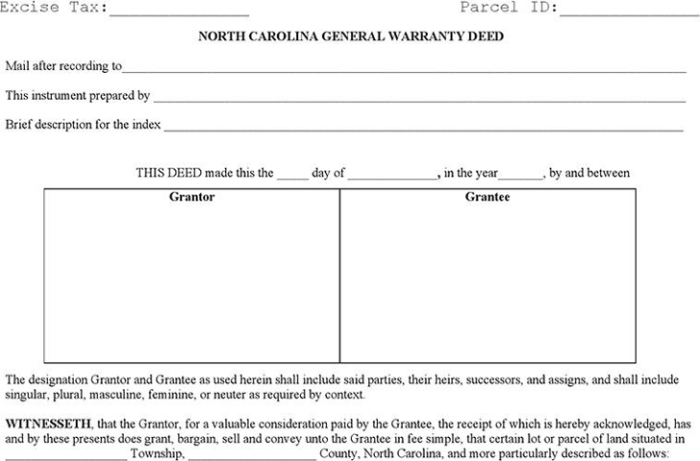North carolina non warranty deed – In the realm of real estate transactions, the North Carolina Non-Warranty Deed emerges as a crucial instrument, offering a unique blend of simplicity and limited liability. This comprehensive guide delves into the intricacies of this legal document, exploring its definition, essential elements, advantages, limitations, and execution procedures.
Non-warranty deeds, as their name suggests, convey property without any express or implied warranties regarding the title or condition of the property. This distinct characteristic sets them apart from other types of deeds and makes them suitable for specific real estate scenarios.
1. Definition and Purpose of a North Carolina Non-Warranty Deed
A non-warranty deed is a legal document that transfers ownership of real property without providing any warranties or guarantees about the property’s title or condition.
The purpose of a non-warranty deed is to convey ownership of the property without the grantor assuming any liability for any defects or encumbrances that may exist on the property.
2. Essential Elements of a Non-Warranty Deed: North Carolina Non Warranty Deed
A valid non-warranty deed in North Carolina must contain the following essential elements:
- Identification of the grantor and grantee
- Legal description of the property
- Statement of conveyance
- Grantor’s signature
- Notarization
3. Covenants and Warranties in a Non-Warranty Deed
Unlike other types of deeds, a non-warranty deed typically does not include any covenants or warranties.
Specifically, a non-warranty deed excludes the following warranties:
- Warranty of title
- Warranty against encumbrances
- Warranty of quiet enjoyment
4. Use Cases and Advantages of a Non-Warranty Deed
Non-warranty deeds are commonly used in the following situations:
- When the grantor does not have a clear title to the property
- When the property is being sold “as is”
- When the grantee is willing to assume the risk of any defects or encumbrances
The advantages of using a non-warranty deed include:
- Simplicity
- Cost-effectiveness
- Reduced liability for the grantor
5. Limitations and Considerations of a Non-Warranty Deed
There are also some limitations and risks associated with using a non-warranty deed:
- The grantee assumes all risk of defects or encumbrances
- The grantor is not liable for any problems with the property
- The grantee may have difficulty obtaining title insurance
To mitigate these risks, it is important to carefully review the non-warranty deed and have it reviewed by an attorney before signing.
6. Procedure for Executing a Non-Warranty Deed in North Carolina
To execute a valid non-warranty deed in North Carolina, the following steps must be followed:
- Complete the non-warranty deed form
- Sign the deed in front of a notary public
- Record the deed with the county register of deeds
7. Sample Non-Warranty Deed

The following is a sample non-warranty deed form that complies with North Carolina law:
[Sisipkan contoh non-warranty deed di sini]
This sample deed can be modified to suit specific circumstances, but it is important to have it reviewed by an attorney before signing.
Essential Questionnaire
What is the primary purpose of a non-warranty deed?
Non-warranty deeds are primarily used to transfer property ownership without providing any guarantees or warranties regarding the title or condition of the property.
What are the key elements of a valid non-warranty deed in North Carolina?
Essential elements include the names of the grantor and grantee, a legal description of the property, the conveyance language, and the signatures of both parties.
What warranties are typically excluded in a non-warranty deed?
Non-warranty deeds exclude all implied warranties, including those of title, merchantability, and fitness for a particular purpose.
When is it appropriate to use a non-warranty deed?
Non-warranty deeds are suitable when the seller cannot or does not want to provide any warranties about the property, such as in estate sales or transfers between family members.
What are the potential risks associated with using a non-warranty deed?
Non-warranty deeds offer limited protection to the buyer, as they do not guarantee the title or condition of the property. Buyers should carefully consider the potential risks before using this type of deed.